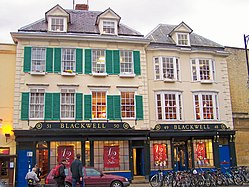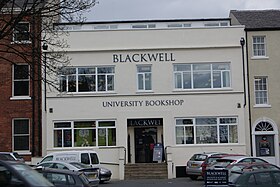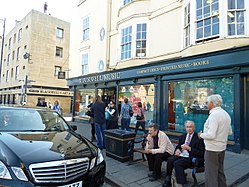Blackwell's: Difference between revisions
→History: Redirects to next wikilink Adding/removing wikilink(s) |
Rescuing 1 sources and tagging 0 as dead. #IABot (v1.4.2) |
||
| Line 48: | Line 48: | ||
==History== |
==History== |
||
[[File:Blackwell B logo.jpg|thumb|Blackwell's sign outside the [[Charing Cross Road]] branch]] |
[[File:Blackwell B logo.jpg|thumb|Blackwell's sign outside the [[Charing Cross Road]] branch]] |
||
The company was founded in 1879 by [[Benjamin Henry Blackwell]], son of the first city librarian, who having finished his education at 13, was apprenticed to a local bookseller for a [[£sd|shilling]] a week. His father, Benjamin Harris Blackwell, had been heavily involved in the [[Temperance movement|Temperance Society]]. The society promoted, as well as [[religion]], self-education and also encouraged reading. The society provided separate rooms for non-alcoholic refreshment and silent reading. A religious family, the Blackwells had also become involved with the Temperance Society due to Benjamin's father being [[teetotal]], and as a protest against the government making money from the [[excise duty]] on alcohol.<ref name="history">{{cite web|title=48 - 51 Broad Street, Oxford|url=http://www.headington.org.uk/oxon/broad/buildings/north/48,49,50,51.htm|work=Broad Street Oxford|publisher=Headington|accessdate=27 January 2012}}</ref> |
The company was founded in 1879 by [[Benjamin Henry Blackwell]], son of the first city librarian, who having finished his education at 13, was apprenticed to a local bookseller for a [[£sd|shilling]] a week. His father, Benjamin Harris Blackwell, had been heavily involved in the [[Temperance movement|Temperance Society]]. The society promoted, as well as [[religion]], self-education and also encouraged reading. The society provided separate rooms for non-alcoholic refreshment and silent reading. A religious family, the Blackwells had also become involved with the Temperance Society due to Benjamin's father being [[teetotal]], and as a protest against the government making money from the [[excise duty]] on alcohol.<ref name="history">{{cite web|title=48 - 51 Broad Street, Oxford|url=http://www.headington.org.uk/oxon/broad/buildings/north/48,49,50,51.htm|work=Broad Street Oxford|publisher=Headington|accessdate=27 January 2012|deadurl=yes|archiveurl=https://web.archive.org/web/20110702063215/http://headington.org.uk/oxon/broad/buildings/north/48%2C49%2C50%2C51.htm|archivedate=2 July 2011|df=}}</ref> |
||
The flagship shop at 48–51 [[Broad Street, Oxford]], was originally only twelve feet square but quickly grew to incorporate the upstairs, cellar and neighbouring shops. Benjamin Henry Blackwell was well respected in Oxford and was elected the first [[Liberal Party (UK)|Liberal]] councillor for Oxford North. |
The flagship shop at 48–51 [[Broad Street, Oxford]], was originally only twelve feet square but quickly grew to incorporate the upstairs, cellar and neighbouring shops. Benjamin Henry Blackwell was well respected in Oxford and was elected the first [[Liberal Party (UK)|Liberal]] councillor for Oxford North. |
||
Revision as of 16:00, 21 July 2017
 | |
| Company type | Private |
|---|---|
| Industry | Retail Bookselling Wholesale |
| Founded | 1879 |
| Founder | Benjamin Henry Blackwell |
| Headquarters | , |
Number of locations | 45 stores (2012) [1] |
Area served | UK |
Key people | Toby Blackwell (Owner) Trevor Goul-Wheeker (Chairman) |
| Products | Books, Maps |
| Revenue | |
Number of employees | 1,000 [3][4] |
| Website | www.Blackwells.co.uk |
Blackwell UK, also known as Blackwell's and Blackwell Group, is a British academic book retailer and library supply service. It was founded in 1879 by Benjamin Henry Blackwell,[5] after whom the chain is named, in Oxford on Broad Street. The firm now has a chain of 45 shops, and an accounts and library supply service. It employs around 1000 staff in its divisions.[3][4]
The Broad Street branches, which include speciality music and art/poster shops, remained the only ones until expansion in the early 1990s, when at peak after taking over Heffers in Cambridge in 1999[6] and James Thin in Scotland in 2002,[7] the company had over 70 outlets.[7] Its library supply chain serves an international market, but parts were sold off in 2009, with the North American arm of Blackwell Book Services and the Australian business James Bennett sold to Baker & Taylor for their academic arm YBP Library Services.[8] The group were also publishers, under the Blackwell publishing imprint which published over 800 journals when it was sold to John Wiley & Sons in 2007 for £572 million to form Wiley-Blackwell.[9]
The Blackwell family have run the company since its foundation, with an ownership divided between voting shares owned by the family and wealth shares owned by family and others.[10] However, there was a public dispute in 2002 between Julian 'Toby' Blackwell, the current owner of the group, and Nigel Blackwell, the former chairman of the publishing arm, about the possible sale of the publishing business. This led to an offer of £300 million from Taylor & Francis[11] and to an eventual deal with John Wiley & Son in 2006, as a result of which Nigel Blackwell and Toby's son Philip Blackwell left the business,[12] leaving Toby Blackwell the sole family member still involved in running the company. Other family voting shares are held by a trust, which Toby's shares will transfer to when he dies, eventually bringing an end to the Blackwell family involvement with the company.[13] Toby Blackwell announced in 2009 that the wealth shares would be distributed between staff, transforming the company into an employee-partnership, similar to that of retailer John Lewis, when the company returns to profitability having spent several years experiencing losses.[10][14] The company reported it was expecting to return to profit in 2012.[10]
On 29 October 2012,[15] Blackwell's was - with Foyles, John Lewis department stores, Waitrose, Sainsbury's and Argos - among the retailers to launch the Nook e-reader - and from, November, the Nook HD and Nook HD+ tablet computers.[16]
History

The company was founded in 1879 by Benjamin Henry Blackwell, son of the first city librarian, who having finished his education at 13, was apprenticed to a local bookseller for a shilling a week. His father, Benjamin Harris Blackwell, had been heavily involved in the Temperance Society. The society promoted, as well as religion, self-education and also encouraged reading. The society provided separate rooms for non-alcoholic refreshment and silent reading. A religious family, the Blackwells had also become involved with the Temperance Society due to Benjamin's father being teetotal, and as a protest against the government making money from the excise duty on alcohol.[5]
The flagship shop at 48–51 Broad Street, Oxford, was originally only twelve feet square but quickly grew to incorporate the upstairs, cellar and neighbouring shops. Benjamin Henry Blackwell was well respected in Oxford and was elected the first Liberal councillor for Oxford North.
Basil Blackwell, Benjamin Henry's son, became the first Blackwell to go to university; he was awarded a scholarship at Oxford University's Merton College. He was expected to join the family firm, however, which he did in 1913, after a spell as an apprentice publisher in London. He was tasked with expanding his father's publishing business.

The first Blackwell publication, Mensæ Secundæ: verses written in Balliol College by H.C. Beeching, was printed in 1897. Blackwell's began the careers of many writers: J. R. R. Tolkien's first poem, "Goblin's Feet", was published in 1915.[5] To promote universal access to literature, Blackwell's pioneered a series of cheaper books, from a one-volume Shakespeare to "3-and-6 novels". The publishing company was merged into the main company in 1921, and a scientific section was added in 1939.
When Benjamin Henry died in 1924, Basil Blackwell took over from his father, and was the firm's "gaffer" for over sixty years. Basil Blackwell also wanted to preserve fine printing. After rescuing the Shakespeare Head Press, he commissioned belles-lettres, including well-known classics such as the Pilgrim's Progress, the works of the Brontës and a complete version of Chaucer's Canterbury Tales.
In 1966, the Norrington Room was opened, named after Sir Arthur Norrington, the President of Trinity College and extending under part of Trinity College. It boasts three miles (5 km) of shelving and at 10,000 square feet (930 m2) merited an entry in the Guinness Book of Records as the largest single room selling books.[17]
Recent history
The company has followed a determined policy since the 1990s to spread out from its traditional Oxford base and take on a much broader UK presence.
In 1995, Blackwell's became the first bookshop in the UK to allow its customers to purchase online from a catalogue of over 150,000 titles, and opened a flagship shop in London the same year, at 100 Charing Cross Road, which is now one of the company's six most prominent shops.[5] Blackwell's took over the Heffers bookshops in Cambridge in 1999, and in 2002 acquired the academic bookshops of James Thin in Scotland.
Blackwell's now has over 60 retail outlets across the UK, including a number of medical and other specialist bookshops, and even a shop in Aberdeen specialising in the oil industry.[5] Both the Oxford and London flagship shops have won Bookseller of the Year at the British Book Awards.[5]
The company is still in the hands of the Blackwell family. Support for its activities, including Blackwell's Online, is based at Beaver House in Oxford.[5] The company was to be partially funded by Toby Blackwell Limited in 2012.[18]
Locations
Blackwell's maintains over 40 retail outlets across the UK, with flagship stores located in Oxford, Cambridge, Edinburgh and London. Other branches are located on university campuses or are specialist branches, focusing on Music and Art.
Gallery
-
Flagship branch, 48-51 Broad Street, Oxford
-
Woodhouse Lane, Leeds
-
Cambridge Road, University of Portsmouth
-
Whiteknights, University of Reading
-
Portobello Street, University of Sheffield
-
Heffers, Trinity Street, Cambridge
-
Heffers Sound, Trinity Street, Cambridge
-
Blackwell's Music, previously at 23-25 Broad Street, Oxford
-
Blackwell's Art and Poster Shop, 27 Broad Street, Oxford
References
- ^ "Our Shops". Blackwells Online. Retrieved 1 February 2012.
- ^ a b Shaffi, Sarah (2 October 2014). "Blackwell's returns to profit". The Bookseller. Retrieved 1 March 2015.
- ^ a b Finch, Julia (8 September 2010). "Blackwell book chain owner plans to hand firm over to staff". The Guardian. Retrieved 27 January 2012.
- ^ a b Campbell, Lisa (10 May 2011). "Blackwell cuts 19 from library supply business". The Bookseller. Retrieved 27 January 2012.
- ^ a b c d e f g "48 - 51 Broad Street, Oxford". Broad Street Oxford. Headington. Archived from the original on 2 July 2011. Retrieved 27 January 2012.
{{cite web}}: Unknown parameter|deadurl=ignored (|url-status=suggested) (help) - ^ "Blackwell's rationalises Heffers Branches". AllBusiness. 1999. Retrieved 1 February 2012.
- ^ a b Cave, Andrew (20 April 2002). "Blackwell wins Thin in family feud lull". The Telegraph. Retrieved 1 February 2012.
- ^ Neilan, Catherine (8 December 2009). "Blackwell Sells Library supply arm". The Bookseller. Retrieved 1 February 2012.
- ^ Osborne, Alistair (18 November 2006). "Blackwell duo bury hatchet as publisher is sold to John Wiley". The Telegraph. Retrieved 1 February 2012.
- ^ a b c Denny, Neill (8 September 2010). "Blackwell's to close head office, as power shifts to staff". The Bookseller. Retrieved 2 February 2012.
- ^ Bowers, Simon (23 January 2002). "Blackwell's journal of disquiet". The Guardian. Retrieved 2 February 2012.
- ^ Wallows, Harry (20 January 2006). "Blackwell's starts fresh chapter". The Telegraph. Retrieved 2 February 2012.
- ^ Denny, Neill (28 May 2009). "Last King of Blackwell's". The Bookseller. Retrieved 2 February 2012.
- ^ Campbell, Lisa (31 March 2011). "Blackwell Group halves losses within a year". The Bookseller. Retrieved 27 January 2012.
- ^ Last-minute delay to UK Nook launch, Lisa Campbell, The Bookseller, London.Retrieved 8 December 2012.
- ^ Barnes & Noble's Nook HD and HD+ tablets will come to UK in November, Ian Steadman, wired.co.uk, 26 September,2012 Archived December 4, 2012, at the Wayback Machine.Retrieved 8 December 2012.
- ^ The Guinness Book of Records (14th ed.). London: Guinness Superlatives Limited. 1967. p. 123. ISBN 0-900424-00-1.
- ^ Campbell, Lisa (26 March 2012). "Revenue drops but losses down at Blackwell". The Bookseller. Retrieved 16 April 2012.










